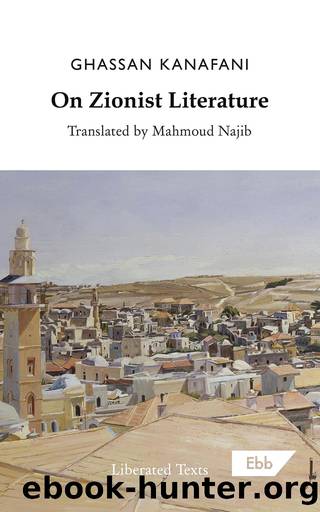On Zionist Literature by Ghassan Kanafani

Author:Ghassan Kanafani
Language: eng
Format: epub
Publisher: Ebb Publishing Limited
Published: 2023-02-15T00:00:00+00:00
6. Jewish Infallibility and the Unworthiness of Other Peoples
Reuben Wallenrod explains the infallibility and absolute superiority of the Jewish hero by saying that the Jewish writer âvery often loses his objectivityâ because âof this feeling of complete identification with life about him and his responsibility for it.â Therefore, âthe emotional closeness to the events and characters lends charm to his work, but a certain myopia also results from this intimacy.â1 The opposite is true, in fact, as we will see: when Jewish writers are indeed mentally and physically close to the events of the novel, they tend not to lack objectivity as much as the Zionist writer who writes from a distance. For this reason, we will notice a correlation between the lack of objectivity and the practice of writing from a distance: Leon Uris in Exodus not only suffers from myopia, but also from near-complete mental blindness.2 Yael Dayan, on the other hand, is relatively more objective because she is closer to the events.
What is truly worth noting is Wallenrodâs claim that a feeling of absolute unity with oneâs identity and its responsibilities represents a âlogical reasonâ for losing oneâs objectivity. This can only be true under one condition: when that identity and its responsibilities are not objective to begin with. Wallenrodâs observation would be completely correct if rephrased in the following terms: the Jewish writerâs defense of an unobjective cause can only be achieved through unobjective means. This is exactly what explains the contradictions that befall Jewish writers of fiction.
In David Shimoni (born in 1886 and arrived in Palestine in 1909), we will soon encounter a poet who was truly close to the events. In his poem The Grave he discusses a man called Katriel who disliked being described as a pioneer. He protests against the imposed idea that he had carried out a great sacrifice: âthere is nothing to praise, for the life they left was horrible.â He sees Palestine as the only place where the Jewish individual may exist with freedom and dignity.3 He also protests the aura of heroism that has been imputed to the work of the Jewish youth in Palestine â because this is the only country in the world that provided Jews with an opportunity to live. But such a perspective would not last for long: the infallible Jewish hero will take its place and represent absolute superiority in every sense. Little by little, this character will come to represent a discernible phenomenon in Zionist literature, quite distinct from the crude heroes and villains in tales of the Second World War and cheap novels of the American West. This is not a case that can be described as âmyopia,â as Wallenrod would have it. It is, rather, a recalcitrant psychological complex that disguises itself in a deep-seated and absolutely racist sense of superiority.
At an early point, the Jewish writer Yaakov Rabinowitz (1875-1949) presented his character Amosai in an eponymous novel in the following way:
[he is] an extraordinary man. Living dangerously, he is equal to all occasions.
Download
This site does not store any files on its server. We only index and link to content provided by other sites. Please contact the content providers to delete copyright contents if any and email us, we'll remove relevant links or contents immediately.
4 3 2 1: A Novel by Paul Auster(12392)
The handmaid's tale by Margaret Atwood(7763)
Giovanni's Room by James Baldwin(7346)
Asking the Right Questions: A Guide to Critical Thinking by M. Neil Browne & Stuart M. Keeley(5775)
Big Magic: Creative Living Beyond Fear by Elizabeth Gilbert(5771)
Ego Is the Enemy by Ryan Holiday(5448)
The Body: A Guide for Occupants by Bill Bryson(5096)
On Writing A Memoir of the Craft by Stephen King(4944)
Ken Follett - World without end by Ken Follett(4732)
Adulting by Kelly Williams Brown(4574)
Bluets by Maggie Nelson(4556)
Eat That Frog! by Brian Tracy(4540)
Guilty Pleasures by Laurell K Hamilton(4449)
The Poetry of Pablo Neruda by Pablo Neruda(4108)
Alive: The Story of the Andes Survivors by Piers Paul Read(4033)
White Noise - A Novel by Don DeLillo(4010)
Fingerprints of the Gods by Graham Hancock(4004)
The Book of Joy by Dalai Lama(3986)
The Bookshop by Penelope Fitzgerald(3853)
